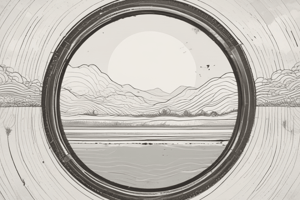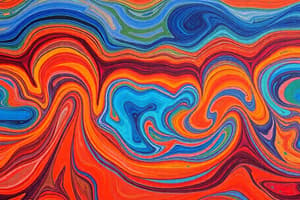Podcast
Questions and Answers
What do El Niño and La Niña collectively make up?
What do El Niño and La Niña collectively make up?
- Tropical weather cycle
- Equatorial climate cycle
- ENSO cycle (correct)
- Pacific Ocean cycle
How often do El Niño and La Niña episodes occur?
How often do El Niño and La Niña episodes occur?
- Every 1-2 years
- Every 8-10 years
- Every 3-5 years (correct)
- Every 5-7 years
When do El Niño and La Niña usually form?
When do El Niño and La Niña usually form?
- In the winter, between December and February
- In the fall, between September and November
- In the spring, between March and May
- In the summer, between June and August (correct)
What causes the cooler water in the eastern part of the Pacific Ocean?
What causes the cooler water in the eastern part of the Pacific Ocean?
When does El Niño event occur?
When does El Niño event occur?
What creates Rossby waves in the ocean?
What creates Rossby waves in the ocean?
What is the effect of La Niña in the U.S.?
What is the effect of La Niña in the U.S.?
What is the role of Kelvin wave in relation to El Niño and La Niña?
What is the role of Kelvin wave in relation to El Niño and La Niña?
What are the effects of El Niño and La Niña on Australia and Indonesia?
What are the effects of El Niño and La Niña on Australia and Indonesia?
Why is predicting the effects of ENSO cycles important?
Why is predicting the effects of ENSO cycles important?
Flashcards are hidden until you start studying
Study Notes
El Niño and La Niña
- El Niño and La Niña collectively make up the El Niño-Southern Oscillation (ENSO) cycle.
Frequency and Formation
- El Niño and La Niña episodes occur every 2-7 years.
- El Niño and La Niña usually form during the winter months (December to February) in the Northern Hemisphere.
Cooler Water in the Pacific Ocean
- The trade winds blowing from east to west cause the cooler water in the eastern part of the Pacific Ocean.
El Niño Event
- An El Niño event occurs when the trade winds weaken, and the warmer water spreads from the western Pacific towards the eastern Pacific.
Rossby Waves
- Rossby waves in the ocean are created by the rotation of the Earth and the Coriolis force.
La Niña Effects in the U.S.
- La Niña typically brings cooler and wetter conditions to the Pacific Northwest, and warmer and drier conditions to the Southwest in the U.S.
Kelvin Wave
- A Kelvin wave is a type of ocean wave that plays a key role in initiating and sustaining El Niño and La Niña events by propagating warm or cool water anomalies across the Pacific Ocean.
Effects on Australia and Indonesia
- El Niño events tend to bring drought to Australia and wildfires, while La Niña events tend to bring heavy rainfall and floods.
- El Niño events tend to bring drought to Indonesia, while La Niña events tend to bring heavy rainfall and floods.
Predicting ENSO Cycles
- Predicting the effects of ENSO cycles is important for agricultural planning, water resources management, and disaster preparedness, as it can help mitigate the impacts of El Niño and La Niña events on ecosystems and human societies.
Studying That Suits You
Use AI to generate personalized quizzes and flashcards to suit your learning preferences.




